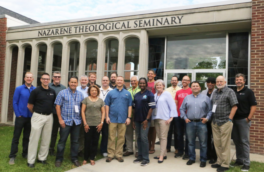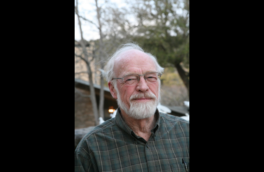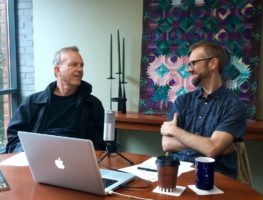What do leaders do with the Bible when a congregation is divided? In the midst of conflicts over women in ministry, LGBTQ sexuality, racism, immigration, how do leaders lead a people with the Bible through discernments? Assuming Christians agree on the Bible’s authority over our lives and we trust the Holy Spirit to work in and among us to understand the Bible, how do congregations discern disagreement when we disagree on what the Bible says?
Look to the Expert
In churches of the past, Christians have turned to the senior pastor to lead through disagreements over the Bible. In other words, we looked to the expert. This usually meant that the pastor—the well-educated professional who is trained to study the issue in the Bible—studies, comes to a conclusion, teaches on the conclusion, and then calls the people to be faithful to the conclusion. The congregation follows because, after all, this pastor is the expert on the Bible, and the Bible is authoritative, so we must follow what he (mostly it was a “he”) says.
With denominational disagreements, a similar process happens. Pastors/leaders/authorized experts are called together to study the issue in the Bible, discuss it, and draw up a pronouncement. Their conclusions are submitted to the local congregations as binding on its churches. If the denomination is congregational in its polity, it would send the pronouncement to be voted on by the churches. Nonetheless, the edict would come from above.
This approach depends upon a belief that the Bible is God-breathed, verbally-inspired, inerrant text. There is a common, if unspoken, assumption that there is one meaning to the text, the meaning in the mind of the author upon its writing (Read THIS RIFF by Scot McKnight on this subject). The Bible therefore should be read for its literal meaning (this is what it means to be “literal”) wherever possible. A good student of the Bible (an expert), well trained in understanding the Bible historically, should be able to do all of this and then teach the congregation in such a way that everyone should be able to give their allegiance to what the Bible teaches on any given subject.
This approach has worked well in the Protestant Reformation era. Built on a broad Christianized Euro consensus, where everyone agreed on the inherited doctrines and beliefs, people mostly trusted the Lutheran priest or the Geneva Bible teacher. Moral issues were rarely an issue as most people already agreed on the basics. This approach worked well then because there were fewer major moral disagreements to fight over and there was still largely trust in the clergy professional to do the work he (again it was mostly a “he”) was being paid to do.
But today, among the fragmented protestantism of the West, and the many independent nondenominational evangelical megachurches, this approach is proving ineffective. Today, we have a dispute, say over women in leadership alongside men, or LGBTQ sexuality, and we call upon the pastor, with the elder board (maybe), to study and present the biblical understanding and directive. The pastor makes the presentation and takes a few questions. Any dissenters are responded to by the pastor in a congregational meeting, and then the issue is closed. Those who agree stay, those who don’t leave. And the church becomes more divided with each new conflict. People join sides, each one with Bible in hand, further motivated to go on arguing against one another from across the lawns of the various churches.
The Other Option
There is another approach. It finds resources in what some have called the “Theological Interpretation of Scripture.’ ( Daniel Treier and Stephen Fowl have good intros). Acts chapter 15 provides a model for this approach.
The main idea is this: The community is the place of discernment. Faced with the dispute over whether Gentiles needed to be circumcised (among other things) to become a Christian, the church met as a community. Versus deferring the issue to the expert, it appears a wider section of community was involved. Notice a few key things here:
- the presence of the whole community mentioned in Acts 15 as they gathered in Jerusalem
- they met and heard dissenting voices (vs. 4, 5)
- even though the apostles and elders met separately, they presented their wisdom before “the whole assembly” (v. 12)
- a proposal is made (vs. 19-21)
- the “whole church’s consent” is involved (v. 22) in the decision
- the decision is presented with the words, “it seems good to the Holy Spirit and to us…”. The “us,” it could be inferred, represented the whole community of gathered people.
In other words, Acts 15 is a process of a whole community listening and participating in the Spirit’s work. The community is the place of discernment. Click To Tweet
One of the important things to do as a leader is to recognize we are all part of a community of interpretation already. The Bible has never functioned independently of a church history of interpreting the Bible. The mere fact we possess a translated Bible bears witness to this fact. Furthermore, every one of us comes to the text with a bias that we learned from a previous community with a history of interpretation.
Many of us interpret, for example, Romans 3:23, “All have sinned and fallen short of the glory of God,” based on an evangelical, Lutheran, or perhaps Catholic reading of that text. We see the universal condition of sin and its recognition individually as the starting point for salvation. There are historical reasons for the way this emphasis in interpretation has come into being. But there are other insights and interpretations. This doesn’t mean my interpretation is not true. Rather it just has a particular emphasis on a particular truth addressing a particular issue during a particular time. Perhaps even this emphasis has led to some excesses?
Whenever a dispute arises in a church, we first gather those who are sufficiently interested to devote time and energy to discern Scripture and what the Spirit is doing, where He is leading. We gather as a community, to listen to each other and the Bible, submit our gifts, and discern together for the furtherance of His Kingdom in this issue in the life of our church.
Here are a few steps I would suggest:
- At the outset, I think it is imperative for the pastor/leader to start a discussion by having various people own their interpretations of Scripture. Everyone should own where they learned these interpretations, and the history of that interpretation represented in it, recognizing its particular emphases and why those emphases might have been important at a particular time for that church in the past. This sets the stage to look at Scripture again and the blind spots of the past but also the key insights we might be led to extend into the future.
- From here, the teachers will surely teach from Scripture. But witnesses will also speak as to what is happening on the ground, the pastors will give voice to pastoral concerns in the midst. In the process, we are not looking for the one true meaning of the text for all time. We are instead looking to extend the Scriptures faithfully to this new situation. We do not get to make things up. But we also must discern new emphases that apply to the situation we are in. The teachers are not mavericks. They are accountable to a history of interpretation and the community. But the other gifts are allowed their voice. Together we discern what God is saying to us from these texts for how we are to go forward in our disagreement.
- The Holy Spirit is recognized as working. We hear the stories that have lead up to the current dispute. We hear how we are being challenged to think through how to engage a new situation. Over and over again, stories are told in Acts 15 which challenged the accepted wisdom on Jewish proselytization rules (vs. 4, 8). The fruit of the Holy Spirit is recognized and then placed within the context and interpretation of Scripture (v. 14). Likewise, when we gather to discern, we listen to what is happening, recognize the fruit, and seek to make sense of these challenging situations by placing them within the ongoing context of Scripture. We see, where because of an emphasis, we might have missed something. Clarity will come as we see some point of continuity with what God has been doing and revealing in and through Scripture.
- The ones leading will steer to a group consensus. It will not be rushed. It will be the moment when we can say, like in Acts 15, “it seems good to us and the Holy Spirit …”.
Some Pointers I’ve Learned Along the Way
When I talk to leaders about leading in this manner with the Bible, I make some of the following suggestions.
Don’t lead via the Bible as singular expert, then get elders behind you, and make an edict! This approach misses the opportunity to follow God into new places and coalesce a whole community together for what God is doing.
Don’t lead by doing an info dump—giving all the options on an issue—and then letting the congregation decide by taking a vote. This also just divide the community and does not lead to a new place.
Call a meeting of (only) those interested in discerning the issue. Submit to one another. Listen to one another through opening questions. When the time is right, the leaders present a proposal fleshing it out piece-by-piece. Then the leader says, “I submit to you.” The proposal, including its interpretation of Scripture, becomes the starting point from which objections and alternative views are heard. These are discerned until this proposal changes, grows, and gets nuanced to where all can agree to some extent.
We are not looking for a moment when everyone in the room agrees entirely with no reservations. Many times, 50% of the people agree wholeheartedly, but the other 50%, though they are not convinced, can submit to the other 50% because they trust it, have been heard, have no strong objections, and have no other answers either.
At this point, we close the discernment by saying, “It seems good to us and the Holy Spirit,” and move further, deeper, into the Kingdom together.
I explore these themes further in my upcoming book early 2019 entitled, “The Church of Us versus Them: Freedom From a Faith That Feeds on Making Enemies.” In the meantime, what have I missed in this brief excursus.? What tips do you have in leading through a conflict with the bible? Don’t lead via the Bible as singular expert then get elders behind you and make an edict! This approach misses the opportunity to follow God into new places & coalesce a whole community together for mission. Click To Tweet













Missio Alliance Comment Policy
The Missio Alliance Writing Collectives exist as a ministry of writing to resource theological practitioners for mission. From our Leading Voices to our regular Writing Team and those invited to publish with us as Community Voices, we are creating a space for thoughtful engagement of critical issues and questions facing the North American Church in God’s mission. This sort of thoughtful engagement is something that we seek to engender not only in our publishing, but in conversations that unfold as a result in the comment section of our articles.
Unfortunately, because of the relational distance introduced by online communication, “thoughtful engagement” and “comment sections” seldom go hand in hand. At the same time, censorship of comments by those who disagree with points made by authors, whose anger or limited perspective taints their words, or who simply feel the need to express their own opinion on a topic without any meaningful engagement with the article or comment in question can mask an important window into the true state of Christian discourse. As such, Missio Alliance sets forth the following suggestions for those who wish to engage in conversation around our writing:
1. Seek to understand the author’s intent.
If you disagree with something the an author said, consider framing your response as, “I hear you as saying _________. Am I understanding you correctly? If so, here’s why I disagree. _____________.
2. Seek to make your own voice heard.
We deeply desire and value the voice and perspective of our readers. However you may react to an article we publish or a fellow commenter, we encourage you to set forth that reaction is the most constructive way possible. Use your voice and perspective to move conversation forward rather than shut it down.
3. Share your story.
One of our favorite tenants is that “an enemy is someone whose story we haven’t heard.” Very often disagreements and rants are the result of people talking past rather than to one another. Everyone’s perspective is intimately bound up with their own stories – their contexts and experiences. We encourage you to couch your comments in whatever aspect of your own story might help others understand where you are coming from.
In view of those suggestions for shaping conversation on our site and in an effort to curate a hospitable space of open conversation, Missio Alliance may delete comments and/or ban users who show no regard for constructive engagement, especially those whose comments are easily construed as trolling, threatening, or abusive.